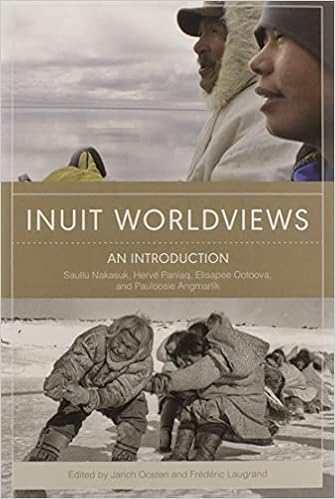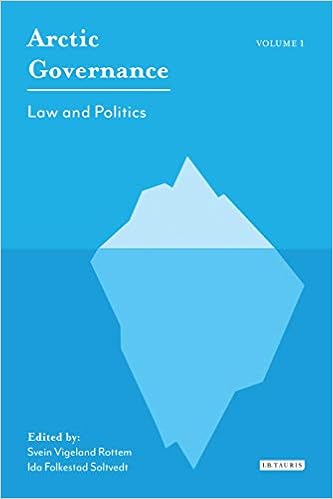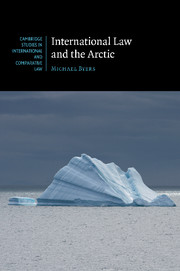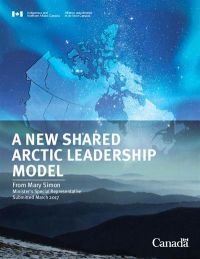Polar Law
Collection of materials to help Law students with research involving the polar regions
Search encyclopedias 

Related Libguides
Librarian
eBook Collections
-
The Routledge Handbook of the Polar Regions by Mark Nuttall, Torben R. Christensen & Martin J. Siegert (Editors)
The Routledge Handbook of the Polar Regions is an authoritative guide to the Arctic and the Antarctic through an exploration of key areas of research in the physical and natural sciences and the social sciences and humanities. -
Arctic Geopolitics, Media and Power by Annika Nilsson E.; Miyase Christensen
Arctic Geopolitics, Media and Power provides a fresh way of looking at the potential and limitations of regional international governance in the Arctic region. Far-reaching impacts of climate change, its wealth of resources and potential for new commercial activities have placed the Arctic region into the political limelight. In an era of rapid environmental change, the Arctic provides a complex and challenging case of geopolitical interplay. -
Protecting the Arctic: Indigenous People and Cultural Survival by Mark Nuttall
Protecting the Arctic explores some of the ways in which indigenous peoples have taken political action regarding Arctic environmental and sustainable development issues, and investigates the involvement of indigenous peoples in international environmental policy- making. Nuttall illustrates how indigenous peoples make claims that their own forms of resource management not only have relevance in an Arctic regional context, but provide models for the inclusion of indigenous values and environmental knowledge in the design, negotiation and implementation of global environmental policy.
-
Breaking Ice: Renewable Resource and Ocean Management in the Canadian North by Fikret Berkes (Editor) et al
The pace of technological, social, and environmental change in Canada's Arctic has profound effects on resource management and policy decisions. The chapters in this volume result from a project undertaken by the Ocean Management Research Network that examines the nature of Arctic environmental evolution and sustainability. -
Arctic Science, International Law and Climate Change by Susanne Wasum-Rainer (Editor) et al
Developments in the Arctic region are increasingly part of international discussion. The book contains a comprehensive and interdisciplinary analysis of the current problems around marine scientific research in the Arctic region. It combines scientific, legal and policy aspects. The main questions addressed are: ongoing and future Arctic marine research, marine research in the Arctic Ocean in practice, the legal framework, enlarged continental shelves and the freedom of marine science and particularities and challenges of the Arctic region. The contributors are leading experts in the field of politics, law and science.
-
Breaking the Ice: Canada, Sovereignty and the Arctic Extended Continental Shelf by Elizabeth Riddell-Dixon
The Hill Times: Best Books of 2017 The Arctic seabed, with its vast quantities of undiscovered resources, is the twenty-first century's frontier. In Breaking the Ice: Canada, Sovereignty and the Arctic Extended Continental Shelf, Arctic policy expert Elizabeth Riddell-Dixon examines the political, legal, and scientific aspects of Canada's efforts to delineate its Arctic extended continental shelf. -
The Fast-Changing Arctic: Rethinking Arctic Security for a Warmer World
International scholars and military professionals come together to explore the strategic consequences of the thawing of the Arctic. Their analyses of efforts by governments and defence, security, and coast guard organizations to address these challenges make timely and urgent reading. -
A Historical and Legal Study of Sovereignty in the Canadian North : Terrestrial Sovereignty, 1870-1939 by Smith, Gordon W; Lackenbauer, P. Whitney
Researched and written over three decades, this comprehensive and thoroughly documented study offers important insights into evolving understandings of Canada’s sovereignty from the original transfers of the northern territories to the young dominion through the start of the Second World War. -
Biocultural Diversity and Indigenous Ways of Knowing by Karim-Aly Kassam
Dramatic challenges face human civilization everywhere. Relations between human beings and their environment are in peril, with mounting threats to both biological diversity of life on earth and cultural diversity of human communities. The peoples of the Circumpolar Arctic are at the forefront of these challenges and lead the way in seeking meaningful responses.
-
A New Shared Arctic Leadership Model by Simon, MaryThis report provides advice to the Minister of Indigenous and Northern Affairs Canada on two topics: new ambitious conservation goals for the Arctic in the context of sustainable development, and the social and economic priorities of Arctic leaders and Indigenous peoples living in remote Arctic communities
-
Research Handbook on Polar Law by Karen N. Scott & David L. VanderZwaag (Editors)
This timely Research Handbook explores the concept of polar law as a coherent body of law and as a set of rules and principles that applies to both the Arctic and Antarctic. It captures the evolution of polar law and policy, identifying future directions for research in this emerging and growing field. -
Governing Marine Living Resources in the Polar Regions by Nengye Liu, Cassandra M. Brooks & Tianbao Qin (Editors)
Bringing together leading scholars from across a diverse range of disciplines, this unique book examines a key question: How can we best conserve marine living resources in the Polar regions, where climate change effects and human activities are particularly pressing? -
Protecting the Third Pole by Simon Marsden
This highly topical book considers the important question of how best to protect the environment of the Third Pole - the area comprising the Hindu Kush Himalayas and Tibetan Plateau - using the tool of international law; specifically, international environmental law and the law of international watercourses. -
The Politics of the Arctic by Geir Hønneland (Editor)
The Arctic ice cap is melting and scientists are uncertain about how this will affect ecosystems. At the same time, the Arctic is the object of heated political discussion. Who shall extract the oil when the ice disappears? How are marine delimitation lines established? Who will control the new sea routes that are opening up? Who actually owns the Arctic? This book brings together some of the most authoritative journal articles on Arctic politics publishes since the end of the Cold War. -
Chapter 12: Disaster definitions from an Arctic perspective by Natalia Andreassen and Rebecca Pincus
From "Defining Disaster": This timely book unpacks the idea of 'disaster' from a variety of approaches, broadening understanding and improving the usability of this complex and often contested concept.
Streaming Media
-
Polar GeopoliticsPolar Geopolitics analyzes the local and global implications of rapid climate change and rising international interest in the Arctic and Antarctica. The podcast is centered around in-depth discussions with experts on a wide array of topics relevant to the northern and southern polar regions.
-
TAI BOOKSHELF PODCASTTAI Bookshelf Podcast is The Arctic Institute’s audio series that takes you beyond the headlines and into the nitty gritty of Arctic research.
-
This LandThis short documentary recounts a 2000-km expedition undertaken by 7 rangers (both Inuit and non-Native) and a female filmmaker to raise a flag on the northernmost tip of Canadian soil, 412 km from the North Pole. Features a mesmerizing soundtrack by Nunavut-born singer Tanya Tagaq.
-
Broken Promises - The High Arctic RelocationIn the summer of 1953, the Canadian government relocated seven Inuit families from Northern Quebec to the High Arctic. They were promised an abundance of game and fish, with the assurance that if things didn't work out, they could return home after two years. Two years later, another 35 people joined them. There they suffered from hunger, extreme cold, sickness, alcoholism and poverty. It would be thirty years before any of them saw their ancestral lands again.
-
Arctic MeltdownNarrated by David Suzuki, this three-part series documents the drastic changes in Canada’s North. Global warming is opening a wealth of business opportunities there, but can the Arctic’s sensitive ecosystems handle the strain of all this industry? Environmentalists, entrepreneurs, other nations vying for sovereignty – who will control the Arctic’s future?
-
Polar Bear FeverThe polar bear has become the new poster child for climate change, the perfect photogenic symbol for selling an environmental message. Polar Bear Fever takes us on a journey to meet the people who are obsessed with the bear. Few can resist the bear’s red-hot image — scientists and zookeepers, photographers and filmmakers, environmentalists and politicians, marketing mavens and advertising giants.
-
Criterion on Demand This link opens in a new windowA collection of thousands of online videos, including To the Arctic and the classic documentary An Inconvenient Truth.
-
Kanopy Streaming Service This link opens in a new windowCheck out films like Throat Song or the many titles on the environment and climate change.
Legal Databases
-
CanLII (Canadian Legal Information Institute) This link opens in a new window
Provides access to court judgments, tribunal decisions, statutes and regulations from all Canadian jurisdictions.
-
HeinOnline This link opens in a new windowOnline research product with legal databases, journals, treaties, and other collections.
Also includes:
*Selden Society Publications and the History of Early English Law
*Scottish Legal History: Featuring Publications of the Stair Society
*Air and Space Law
*John F. Kennedy Assassination Collection
*Executive Privilege
*Business and Legal Aspects of Sports and Entertainment (BLASÉ) -
Lexis+ Canada - for Law Students only (formerly Lexis Advance Quicklaw) This link opens in a new window
LexisNexis upgraded legal database for Canada with comprehensive primary and secondary sources. Includes access to Practical Guidance.
All new Law Students will need to register for this product. -
Westlaw Edge (Law Students Only) This link opens in a new window
Database of Canadian Law and legal research.
Law Students will need to register for this product.
Other Libraries / Institutes
-
IPCC Special Report on the Ocean and Cryosphere in a Changing ClimateFocus on: Chapter 3, Polar Regions
-
UN Environment Programme - Publications & KnowledgeSee also: their Polar Regions page
-
Arctic Health This link opens in a new windowA central source for information on diverse aspects of the Arctic environment and the health of northern peoples.








